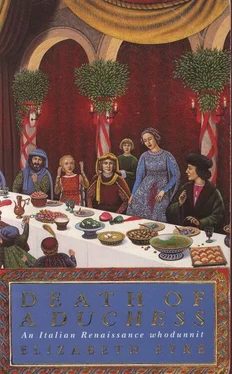Elizabeth Eyre - Death of a Duchess
Здесь есть возможность читать онлайн «Elizabeth Eyre - Death of a Duchess» весь текст электронной книги совершенно бесплатно (целиком полную версию без сокращений). В некоторых случаях можно слушать аудио, скачать через торрент в формате fb2 и присутствует краткое содержание. Год выпуска: 0101, Жанр: Исторический детектив, на английском языке. Описание произведения, (предисловие) а так же отзывы посетителей доступны на портале библиотеки ЛибКат.
- Название:Death of a Duchess
- Автор:
- Жанр:
- Год:0101
- ISBN:нет данных
- Рейтинг книги:5 / 5. Голосов: 1
-
Избранное:Добавить в избранное
- Отзывы:
-
Ваша оценка:
- 100
- 1
- 2
- 3
- 4
- 5
Death of a Duchess: краткое содержание, описание и аннотация
Предлагаем к чтению аннотацию, описание, краткое содержание или предисловие (зависит от того, что написал сам автор книги «Death of a Duchess»). Если вы не нашли необходимую информацию о книге — напишите в комментариях, мы постараемся отыскать её.
Death of a Duchess — читать онлайн бесплатно полную книгу (весь текст) целиком
Ниже представлен текст книги, разбитый по страницам. Система сохранения места последней прочитанной страницы, позволяет с удобством читать онлайн бесплатно книгу «Death of a Duchess», без необходимости каждый раз заново искать на чём Вы остановились. Поставьте закладку, и сможете в любой момент перейти на страницу, на которой закончили чтение.
Интервал:
Закладка:
If the Lord Paolo noticed that his question had been answered with another, he merely laughed. ‘Alas. I seem heartless, I know, but I was next to him at the banquet. The trumpets sounded for the toast to his Grace, and poor Matteo, instead of rising to his feet with us, fell straight forward in his dish of scallops. Of course, his cousin Jacopo thought of poison, with a Bandini on Matteo’s other hand, but I – I thought of shellfish, and did not finish my excellent scallops.’
This time the eyes had smiled, and Sigismondo’s face, by nature sombre, responded.
‘What about the missing girl? I suppose it is the Bandini; although how they could have got hold of her is a mystery. Girls of good family are kept so close. What have you discovered?’
Sigismondo smiled again, shrugged and spread his hands. ‘Nothing of use, my lord.’
‘What, then, that is of no use?’
A page in green and white came running in, saw the Lord Paolo and approached him, bowing.
‘I’m waited for.’ Lord Paolo retreated towards the door. ‘His Grace isn’t patient. We must speak later.’
Sigismondo found Benno where he had left him, but dogless. ‘You found a rose-bush?’
‘There was ever such a nice young gentleman that was being carried in a chair, and he stopped them when I was being thrown out and he asked me about the dog and he made his servant take me to the gardener with orders about the rose-bush. He’s the Duke’s nephew that’s a cripple, the Lord Paolo’s son. I never saw him before, he don’t go about the streets.’
Sigismondo gave a hum of general assent. They walked down the wide cobbled ramp, and Benno began to speak but, looking up at the dark, somewhat monumental face, he stopped and trotted alongside in silence. They left the castello, coming out from the gatehouse tunnel and looking over the coral and gold patchwork, higgledy-piggledy, of tiled roofs, punctuated by the tall spires of churches and the towers of minor palaces. Beyond these were fields and the great encircling wall with its gates and turrets; beyond that lay farmland, brown patches of woods and the rising undulations of the hills. The river, which through the centuries had sliced through the hills to the north, had come up against the outcrop of Rocca in the course of its meanderings through the valley and, recognising an immovable object when it saw it, took a respectful loop round its base and dawdled off into the distance where, just visible, lay the sea.
After a walk through the town, Benno found the answer to the question he had not asked. They reached the town’s east gate, not far from di Torre’s house, and Sigismondo fell into conversation with the guard.
Benno might, on experience so far, believe geniality to be well beyond Sigismondo’s capability or even his wishes. Now, in easy conversation with the guard, he flowered into smiles. He told jokes. It could be observed that he had good teeth. In twelve minutes he had established that the guard indeed kept good watch for they were accountable to the Duke’s Marshal, a man in whom the milk of human kindness had long ago curdled. Because of the interest being shown in Rocca by the Duke Francisco of Castelnuova, they kept tally of who went in and out. No strangers this morning, no riders, only market people and the charcoal men; and the di Torre dungcart that went out as usual.
‘That one’s too mean to pay the city scavengers. All his shit has to go back on his own fields.’
‘Nothing unusual about that cart, eh? No escort of angels.’
This went down so well that they almost neglected to tally-in a pigeon seller and a dwarf from up in the hills.
Sigismondo left them, and asked Benno for the handiest way to the next gate. Benno closed his mouth and led Sigismondo through alleys and courts, down arched twittens between houses, through a church, two market gardens, a carpenter’s yard and a square full of washerwomen full of interesting suggestions as to their relationship as the linen was smacked on the troughs, and out onto a main street where Benno halted to smile up proudly. He received an approving hum on three descending major notes, and a grip on the shoulder.
This gate was busy. It took longer, but Sigismondo leant on the wall in the sun, and bought almonds from a passing seller, and handed them round, and commented on the passers-by, the succulence of two girls who went up the street, and the ancestry of the Duke’s Marshal. Before long he was conversing.
Out of this gate, which gave onto the road to another of the Duke’s towns, a good many went. In the early morning, yes, it was easier to notice people. The only outgoers that were unusual and therefore noticeable this morning, for instance, had been a closed litter escorted by a Dominican. It was decrepit, the curtains shabby and both their laces and the horse’s harness mended with twisted tow. The monk was taking his aunt to her family to die among her kin, and the litter-driver was not being paid enough to make him good-tempered.
At the third gate was Benno’s cousin Nardo, gifted from birth with an enormous curiosity and a tongue hinged in the middle. He wanted to know what Benno did, strolling the streets. Benno claimed to be looking for a job, since he rather thought he was out of one. Nardo told him, taking some trouble about it, why his own job would be beyond Benno’s intellectual grasp, and Benno listened, wide-eyed and agape, to a description of what it entailed.
‘Do you have to remember things like who went in and out?’
Nardo not only had to remember any influx of unknown people but was gifted with total recall. In the face of Benno’s amazed incredulity, he recited the day’s traffic. Sigismondo once again leant his shoulders on the wall and listened. Once more he had found a patch of sun that gilded his face and threw the surprising shadow of his eyelashes on his cheekbone. Nardo’s list had some of the properties of infinity, but Benno’s expression did not change. The sole item of interest, a grain of rice in an interminable trickle of sand, was that a party of horsemen had left the town not long after the gates were opened, one man with a girl wearing a fine cloak huddled in his arm. This rider, arranging his own cloak, had lost hold of it just as he rode under the flambeau on the wall, and had shown the Bandini yellow and red beneath.
The great bell in the clock tower gave the town its accustomed nasty shock at last, and Sigismondo heaved his shoulders from the wall, told Benno that he hadn’t got all day, and set off up the street. When Benno caught up with him, he said, ‘Nicely done. Now we need a horse.’
The track they rode out on spread across a hundred yards of countryside. Wagons had made mudholes and deep ruts, and had driven wide to avoid former mudholes and deep ruts, and horsemen had ridden either side of this to avoid the mess, and those on foot had plodded either side of this to avoid the poached hooftracks and manure.
Where any path led off this highway to left or right, Sigismondo rode to look at it and Benno, up behind him on the big bay, would lean to see if what Sigismondo was looking at would tell him what it was. He had no idea why one such path held such appeal for the Duke’s emissary that he turned his horse along it. They rode into trees at the edge of a sizeable wood.
He gazed in the direction of Sigismondo’s pointing finger, where a thin line of smoke waved upwards through the trees ahead. He thought he understood, for anyone tending a fire might of course have noticed horsemen passing with a girl. Sigismondo moved his heels and the horse quickened pace. The riders ducked beneath bare winter branches of the oaks as they went further into the wood. At length they came upon the small clearing and the fire.
Benno writhed round and dropped from the horse, stumbled as his ankles hurt, and was running forward towards the white-dressed figure lying half in the fire. Sigismondo’s feet thudded to the ground and together they lifted the girl from the embers. There was a choking smell of burnt meat, burnt cloth and burnt hair. Benno coughed, a sound very like someone who might vomit.
Читать дальшеИнтервал:
Закладка:
Похожие книги на «Death of a Duchess»
Представляем Вашему вниманию похожие книги на «Death of a Duchess» списком для выбора. Мы отобрали схожую по названию и смыслу литературу в надежде предоставить читателям больше вариантов отыскать новые, интересные, ещё непрочитанные произведения.
Обсуждение, отзывы о книге «Death of a Duchess» и просто собственные мнения читателей. Оставьте ваши комментарии, напишите, что Вы думаете о произведении, его смысле или главных героях. Укажите что конкретно понравилось, а что нет, и почему Вы так считаете.










